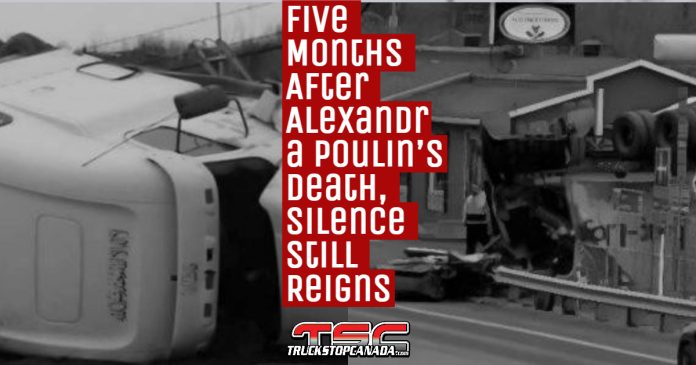 On December 28, the family of Alexandra Poulin, along with citizens and members of the trucking community, gathered in Vallée-Jonction to denounce the dangers of Route 112 and the systemic failures they believe led to a preventable tragedy.
On December 28, the family of Alexandra Poulin, along with citizens and members of the trucking community, gathered in Vallée-Jonction to denounce the dangers of Route 112 and the systemic failures they believe led to a preventable tragedy.
Alexandra, 26, lost her life when her vehicle was crushed by an overturned heavy truck on a slope where vehicles over 15 tonnes were prohibited. The truck was overloaded. Five months later, the pain remains, but it’s the government’s inaction that fuels the growing frustration of her mother, Nathalie Poulin.
 In an interview with Noovo Info, Ms. Poulin stated that she received only a single phone call from the provincial Minister of Transport and Sustainable Mobility Geneviève Guilbault in December and a follow-up email in April. That message highlighted improved road safety statistics over the past 30 years and noted that the pandemic had helped people “recognize the importance of trucking.” For many, including the Poulin family, such justification missed the point entirely. Where was the Ministry before the pandemic?
In an interview with Noovo Info, Ms. Poulin stated that she received only a single phone call from the provincial Minister of Transport and Sustainable Mobility Geneviève Guilbault in December and a follow-up email in April. That message highlighted improved road safety statistics over the past 30 years and noted that the pandemic had helped people “recognize the importance of trucking.” For many, including the Poulin family, such justification missed the point entirely. Where was the Ministry before the pandemic?
Truck Stop Canada was present during the recording of this interview at the Truck On – Le Podcast studio in Beauce. Like many, we were struck by how a tragedy of this magnitude was seemingly brushed aside with generic comments about the value of transportation.
Some of the statements in the email deeply upset Ms. Poulin, and rightfully so.
“No one is held accountable. The company that hired this driver faces no consequences. It’s as if public safety is a hot potato no one wants to handle,” she said.
Since the accident, a single stop sign has been added at the bottom of the Vallée-Jonction hill. Ms. Poulin acknowledges the gesture, but it falls short of the meaningful measures needed to prevent further tragedies. The Sûreté du Québec investigation remains ongoing.
Another warning ignored?
During the night of April 29 to 30, another heavy truck veered off the road in Beauceville, near the intersection of Route du Golf and Route Président-Kennedy. The vehicle landed more than 200 feet off the road, narrowly missing a bike path. Fortunately, no one was injured. Still, this incident, occurring just months after Alexandra’s death, further underscores the urgent need for action.
The Ministry of Transport and Sustainable Mobility has promised a reform: implementing a minimum 125-hour training requirement to obtain a Class 1 driver’s license. But many consider this measure far from adequate—especially for foreign drivers with no winter driving experience.
Let’s be clear: the issue is not about a driver’s origin. It’s about lax practices, poorly maintained vehicles, licenses issued too easily, and the reckless hiring of unqualified candidates. It’s also about the dangerous tolerance for those who bypass the rules. Regardless of who is behind the wheel, every life has equal value.
Standing up for safety is not an attack on truckers or the transport industry. It’s a refusal to normalize negligence. And clearly, that message still hasn’t resonated with those responsible for legislation. That is what we take away from the Ministry’s response to Ms. Poulin.
 After Alexandra Poulin’s death, outrage is not enough
After Alexandra Poulin’s death, outrage is not enough
Alexandra Poulin was not a statistic. She was a vibrant, ambitious young woman, deeply loved. Her death should be a wake-up call. Her name must become a symbol of the change we are still waiting for.
The transport industry needs rigour, not shortcuts. We need frequent inspections, serious oversight of driving schools, a strong presence of enforcement officers, and zero tolerance for companies that put profit before safety—regardless of their name or who they employ.
Words are not enough. Concrete actions must follow. One simple preventive step would be to install cameras at brake check areas. In a digital age, there is no valid excuse not to.
These cameras would identify drivers who skip this crucial safety check. More than a fine, every infraction should trigger a follow-up inspection within the company. A government inspector could then assess vehicle conditions and ensure the carrier truly prioritizes safety. Tough, consistent enforcement might finally bring change.
Every preventable tragedy is a collective failure. When licenses are handed out too easily, signs go ignored, or inspectors lack resources, lives are put at risk. And in the end, it’s families like Nathalie Poulin’s who suffer the consequences.
Alexandra’s name must live on—not to reopen wounds, but to remind us that urgent change is needed. She deserves more than words. The entire industry—authorities, unions, drivers, and citizens—must unite. This isn’t about taking sides. It’s about a basic truth: no life should ever be unjustly lost.
Read More :
Tragedy in Vallée-Jonction: Young Woman Killed in a Crash Involving a Truck
















